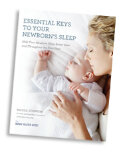
When your newborn isn’t sleeping at night or napping during the day, the entire family is exhausted! You might be considering sleep training your newborn. But, how should you sleep train a newborn? Is it the same as an older baby? And, when can you start? This article will answer these questions based on my experience as a pediatric sleep consultant for over 10 years.
Can You Sleep Train a Newborn?
Yes, you can sleep train your newborn as long as we keep realistic expectations and have an age-appropriate approach!
While many parents expect to lose sleep right after they have a baby, not many can truly grasp how exhausted they will feel until it happens. While you might not be the best sleeper before you have a baby, it’s entirely different when another person is disrupting your sleep cycles multiple times a night. This is different than your own brain waking up periodically to change positions or go to the restroom, for example.
In the first few weeks, your newborn baby will need to eat and get a diaper change around the clock. Therefore, your newborn sleep and feeding schedule will be very repetitive. The days will begin to blur together until your baby starts staying awake more during the day which starts around weeks 4 to 6, on average. This is also the age when we start to see their first smile. 🙂
You May Also Be Interested In…
When To Start Sleep Training Newborns
By 4-8 weeks old, many newborns can start doing longer stretches of sleep. However, not all of them do and newborns stop sleeping for a variety of reasons.
If your baby is waking up a lot at night, you might start to consider sleep training. However, many experts will tell you to avoid sleep training until 4-6 months old.
However, if sleep is not manageable, you are feeling depressed, you have more than one child, or you feel unsafe caring for your newborn in any way, then you might have to start sleep training early.
In my many years of experience, it’s usually best to wait until at least 8 weeks old to start sleep training your newborn. You will want to wait until after the 6 week sleep regression and growth spurt if you can. Your baby may turn a corner on their own by then. If not, you can consider starting sleep training if your daily life is not manageable. In the end, your baby will be better off with a better-functioning parent!
You May Also Be Interested In…
What About Newborn Twins?
When you have twins, life is often doubly exhausting so some twin parents do find they need to do certain things earlier than other parents. We often need to put twins and multiples on the same schedule early, for example. Having two babies the same age on different schedules can lead to quick burnout and exhaustion!
For this reason, many parents of twins do practice putting their babies down drowsy, but awake from birth. It certainly doesn’t hurt to try even if you have a singleton. But, parents of twins may find they have to leave one or more baby fussing a little more than they’d like simply because they only have so many hands! Therefore, sleep training newborn twins can start earlier than 8 weeks by happenstance.
You May Also Be Interested In…
The Best Sleep Training Method for Newborns
Because newborns have limited abilities to self-soothe, it’s important that we have realistic expectations. Most newborns will still need to eat at night, for example. Depending on the age of your baby, they might need to eat every 2-3 hours at night until they are 6-12 weeks old at which time they might start to do at least one 5-8-hour stretch (the technical definition of “sleeping through the night.”
But, even though your newborn likely needs to eat at night, it doesn’t mean you can’t start sleep training. We do sleep training with babies all the time while also keeping night feedings!
So, what is the best sleep training method for newborns?
There are a variety of sleep training methods but for newborns, I prefer a gentler approach. That would include either Fading and/or Pick-Up/Put-Down. And, you can combine the two methods to have a hands-on gentle sleep coaching approach.
Using a gentle approach is helpful so you can test the waters and gradually help your baby gain the skills they need for self-soothing. When you “rip off the band-aid” this can be very stressful and, often, doesn’t work. It is important to focus on health, bonding, and feeding in the early days so you don’t want to do something that might inadvertently disrupt that. Sleep training too harshly too early can possibly lead to skipped feedings and a lot of crying, and we don’t want that if we can avoid that.
Having a newborn leads to a lot of questions, I know. Hopefully, this article has helped you determine if it’s time to start sleep training your newborn. If not, please reach out to us anytime!
You May Also Be Interested In…



